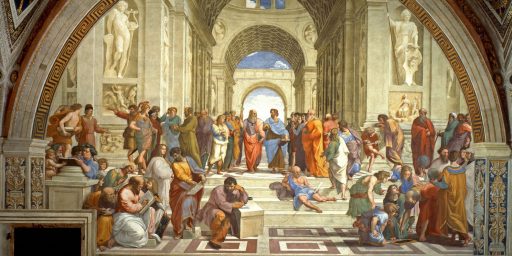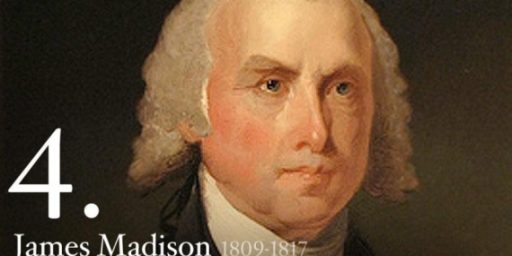Is the U.S. a Democracy?
The Texas Board of Education recently approved new social studies standards and, as you might have heard, they are controversial. I have been following the controversy, ahem, religiously, and I oppose pretty much everything they are doing.
But, I thought a couple of the changes they made were improvements. For one thing, they added Milton Friedman as one of the economists that the kids have to study. This makes sense given how influential he has been and given the amount of respect he gets from other economists (even Krugman has written good things about his work). The other point I agreed with was to refer to the U.S. as something other than a democracy. The term they chose, constitutional republic, is more accurate than simply referring to us as a democracy, and indeed that term has been turned into a blivet (ten pounds of sh*t in a five pound sack).
While there’s nothing wrong with referring to the U.S. as a constitutional republic, another term I would like to see is liberal democracy. Of course, when I use the phrase “liberal democracy” I mean liberal in its classical sense. Together, these two words would not only describe the U.S. well, but also most of Europe. It describes a government structured to effect the peoples’ freedom, without being too specific about the exact nature of the structures (parliamentary, federalist, etc.). I would love to hear other people’s thoughts on this.
One last point on the Texas social studies standards: aside from these items (and perhaps a couple I’m not thinking of) the Texas standards are atrocious!! Removing Thomas Jefferson from the curriculum and replacing him with John Calvin? Saying that the U.S. was founded on Christian values rather than Enlightenment values? Those standards should have been issued with a laugh track.
Update (Rob): My apologies. As Boyd pointed out in comments, I made an error with regard to the science standards. I have removed it from the post.






I learned about both Jefferson and Calvin in my high school social studies classes. Why do the Texans think that kids are too stupid to learn about both?
I’m not sure why you keep dissing the science standards, Robert. In the article you linked, the State Board of Education rejected pro-Creationism proposals. It would help me understand your harping on the science standards if you’d show us which ones you think are wrong.
I admit, that as a (currently out-of-state) Texan, I’m a little defensive since it seems that you’re picking on the board in an area where, to all appearances so far, they’ve actually gotten it right.
Crap, you got me. I forgot they reversed after that whole dust up. I threw it in at the last minute, got it wrong and I should have just left it alone. Thanks for correcting me.
Boyd,
Good catch and you handled it without being ill tempered. I could learn from that.
Gustopher,
I don’t know. Learning about both is reasonable, removing Jefferson is not. It’s a little bizarre.
I have been following the controversy, ahem, religiously, and I oppose pretty much everything they are doing.
Have you been following what’s going on in Texas by reading the Washington Post? Did the WP report this:
What’s so objectionable about reinstating references to Neil Armstrong, Thomas Edison, Columbus, and introducing the Venona Papers evidence in the context of the McCarthy hearings? In fact, I don’t see anything objectionable. No, let me revise that statement, I found it objectionable that liberals removed Edison, Armstrong, Columbus, mention of Independence Day, etc from previous textbooks in order to advance their post-American agenda.
TangoMan,
The fact that there were spies in the government is pretty widely known. What people react to with McCarthy is his bold, unsubstantiated assertions and the witch hunts he went on. As for the Venona Project, this is the first I’m hearing of it and will need to read more.
If you noticed, the things like adding Columbus and Neil Armstrong back were not controversial, and therefore received no coverage. It’s the things like removing Jefferson, implying that the nation was founded on Christian values, adding a comparison of Jefferson Davis’s inaugural to Abe Lincoln’s inaugural, etc. that received the press. Those are the things that are getting the press and rightly so.
TangoMan,
I also like the fact that they added 2nd amendment history into it, since the Supreme Court has ruled on it recently and found that it does in fact confer an individual right.
If you noticed, the things like adding Columbus and Neil Armstrong back were not controversial, and therefore received no coverage. It’s the things like removing Jefferson, implying that the nation was founded on Christian values, adding a comparison of Jefferson Davis’s inaugural to Abe Lincoln’s inaugural, etc. that received the press. Those are the things that are getting the press and rightly so.
The dog that didn’t bark. Where was the controversy about removing references to Independence Day, Columbus, Armstrong, Edison et al. from high school history textbooks? The fact that they have to be reinstated is huge news but because the implication is that the leftist allies of the press did the removing it simply wouldn’t do to shine a light on the reinstatement and better to distract people by the Jefferson issue. Those crazy religious conservatives, look how they’re mucking up history. Ahem, never mind that pink elephant over in the left corner of the room.
It’s the things like removing Jefferson, implying that the nation was founded on Christian values, adding a comparison of Jefferson Davis’s inaugural to Abe Lincoln’s inaugural, etc. that received the press. Those are the things that are getting the press and rightly so.
From what I’ve read they’re placing less emphasis on Jefferson rather than removing him. In itself there is nothing wrong with this revision. I’d need to see the particulars in order to reach a judgment. The Davis and Lincoln inaugural addresses would be interesting material to study. Again, nothing wrong with understanding what the enemy was up to and how they saw their vision. The issue should be how the material will be used to advance a historical narrative. I haven’t seen analysis on that. Christian nation is a loaded term in contemporary usage, but when the nation was founded there wasn’t a big atheistic movement, there were no large blocs of Jews and Muslims and Buddhists alongside the Christian settlers. A Christian undercurrent ran through all of society as an undisputed presence and continued in this fashion for quite a long time. To argue that the US was a christian nation back in the days of founding is not to argue that the US is today a christian nation. The whole point of history is to acknowledge the past, even when the present diverges from the past.
TangoMan,
I agree with you on Armstrong and Edison, et. al. getting removed, but I don’t see the conspiracy here. If the media were making a big deal about reinstating them now, you’d be on firmer ground.
Now you might have something with Columbus, as that does seem to fit the lefty narrative. A white guy gets over here and takes over a country from peaceful Indians, etc. I’m trying to figure out why the left would have it in for Neil Armstrong and the like, and I’m coming up with nothing.
As for the Christian nation stuff, no one disputes the number of Christians now or in the past. What they’re getting at is that the Founders were more diverse than that and that the documents they created (a constitution and declaration) were not Christian.
I agree with you on Armstrong and Edison, et. al. getting removed, but I don’t see the conspiracy here. If the media were making a big deal about reinstating them now, you’d be on firmer ground.
I’d argue the reverse. News is defined as events that interest reporters and editors. The fact that they didn’t report on this doesn’t mean that the removal of these references weren’t significant, it just means that the reporters didn’t think it was worth mentioning because they weren’t struck by it like they were with the Jefferson diminishment.
If I was a news reporter or editor I’d be making a lot of hay about how this committee is having to reinstate what was taken out. I’d be stoking the fire about liberals rewriting history, airbrushing significant Americans out of history and replacing them with minor figures who tickle the fancy of ethnic blocs. When people read that reporting that would set the tone for news coverage and analysis of the event. Would this alternative set of events give my criticisms more standing?
I don’t cede to these reporters and editors the prerogative of deciding what is important news that’s worth covering. They can report what they like and I can disagree as to the significance of what they’ve reported and I can also attach a lot of significance to what they’ve purposely decided to omit from their reporting. Frankly, I think the biggest news in this entire incident is what is having to be reinstated after the liberals tried to rewrite history and yet I haven’t seen mention of this in the MSM.
As for the Christian nation stuff, no one disputes the number of Christians now or in the past. What they’re getting at is that the Founders were more diverse than that and that the documents they created (a constitution and declaration) were not Christian.
There is a difference between commenters on blogs not disputing the demographic characteristics of the early settlers and school textbooks openly acknowledging these characteristics and the religious perspectives of those times. As I stated earlier, I’m not exactly sure what this committee is doing on this christian nation stuff but I do see a very plausible and reasonable path that can reconcile historical accuracy with present day concerns and which leads to liberal sensitivities being tweaked.
Now you might have something with Columbus, as that does seem to fit the lefty narrative. A white guy gets over here and takes over a country from peaceful Indians, etc. I’m trying to figure out why the left would have it in for Neil Armstrong and the like, and I’m coming up with nothing.
Remember that we’re dealing with a 15 person committee here, back when liberals controlled it and now with conservatives in the majority. There are likely all sorts of compromises being made which lack surface validity but might make sense if we knew the power dynamics on that committee.
If there are some committee members who were real race warriors and intent on boosting the achievements of Mexicans in American history, then you’d have to cut some white dudes to make room. Look at what happened this go around:
After reading this and comparing it to the narrative that was presented by the MSM there’s no way that it can be claimed that the conservatives are being the extremists here who want to rewrite history in opposition to the efforts of neutral historians and educators.
Neil Armstrong and Thomas Edison were white men and they represented white male patriarchy and the racist notion of industrialization and the triumph of the military industrial complex and these men shouldn’t be symbols of American greatness. Who knows what claptrap runs through the minds of some leftists. The point is that there was likely a compromise made with some extreme leftist who thought something like this and so Armstrong, Independence Day, and Edison, and Boone, et.al. were removed from the curriculum in order to buy the approval of this leftist on some other point which was deemed more important. I find it quite plausible that whatever is going on with the Jefferson issue is likely a product of the same process. Some religious conservative feels very strongly about Jefferson’s role in history and this is a gesture to him.